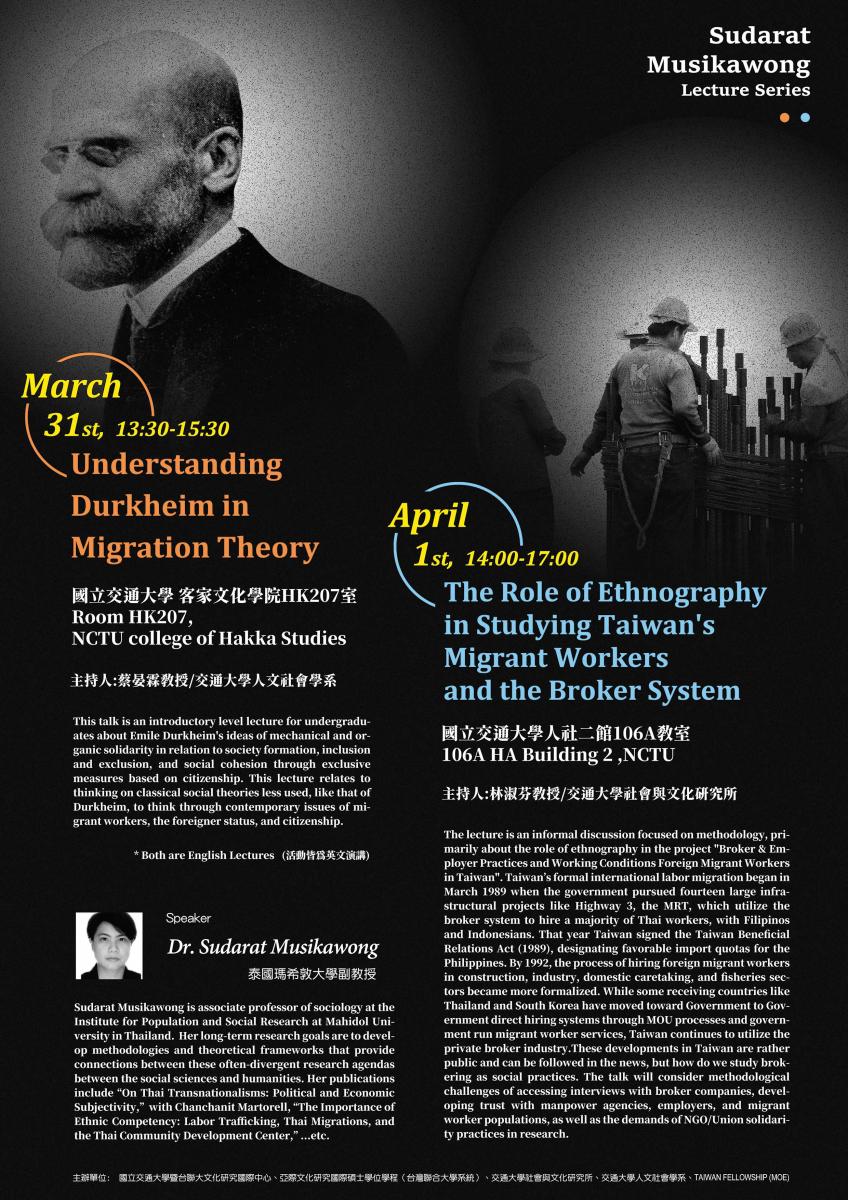
- This event has passed.
Musikawong Sudarat: The Role of Ethnography in Studying Taiwan’s Migrant Workers and the Broker System [Report]
April 1, 2020 @ 2:00 pm - 4:00 pm

Topic: “The Role of Ethnography in Studying Taiwan’s Migrant Workers and the Broker System”
Moderator: Shu-fen Lin, Institute of Social Research and Cultural Studies, NCTU. )
Date: 2020 April 1 14:00-17:00
Venue: 106A HA Building 2,NCTU
Lecture Description: The lecture is an informal discussion focused on methodology, primarily about the role of ethnography in the project “Broker & Employer Practices and Working Conditions Foreign Migrant Workers in Taiwan” (Qualitative Study- June 2019-November 2020).
This project is still ongoing, in collaboration with faculty and researchers at Mahidol University/ IPSR, NCTU/ICCS and National Dongwa University, Department of Sociology. Taiwan’s formal international labor migration began in March 1989 when the government pursued fourteen large infrastructural projects like Highway 3, the MRT, which utilize the broker system to hire a majority of Thai workers, with Filipinos and Indonesians. That year Taiwan signed the Taiwan Beneficial Relations Act (1989), designating favorable import quotas for the Philippines. By 1992, the process of hiring foreign migrant workers in construction, industry, domestic caretaking, and fisheries sectors became more formalized (Chen, 2006). While after 2005, such infrastructural construction projects slowed, the demand for labor in personal care services, SME factories and both long-and short haul fisheries sectors increased. While some receiving countries like Thailand and South Korea have moved toward Government to Government direct hiring systems through MOU processes and government run migrant worker services, Taiwan continues to utilize the private broker industry (recently amended direct employer hiring), waranting more careful study of broker and employer practices.These developments in Taiwan are rather public and can be followed in the news, but how do we study brokering as social practices. The talk will consider methodological challenges of accessing interviews with broker companies, developing trust with manpower agencies, employers, and migrant worker populations, as well as the demands of NGO/Union solidarity practices in research.
Speaker’s Bio
Sudarat Musikawong is associate professor of sociology at the Institute for Population and Social Research at Mahidol University in Thailand. She received her Ph.D. and MA in sociology from the University of California at Santa Cruz and her BA in Interdisciplinary Studies from the University of California at Santa Barbara. As an ethnographer, Dr. Musikawong’s work connects macro-socio-economic historical conditions, social political national circumstances, migration, and cultural production. Her long-term research goals are to develop methodologies and theoretical frameworks that provide connections between these often-divergent research agendas between the social sciences and humanities. Her publications include “On Thai Transnationalisms: Political and Economic Subjectivity,” Manusaya: Journal of Humanities (2009), with Chanchanit Martorell, “The Importanc)e of Ethnic Competency: Labor Trafficking, Thai Migrations, and the Thai Community Development Center,”…etc.
*English Lecture
主辦單位:國立交通大學暨台聯大文化研究國際中心、亞際文化研究國際碩士學位學程(台灣聯合大學系統)、交通大學社會與文化研究所、交通大學人文社會學系、TAIWAN FELLOWSHIP (MOE)
Lecture Report
Written by Kenzi Chen (Postdoctoral Fellow, International Center for Cultural Studies)
Established in 1971, Institute for Population and Social Research IPSR conducts research and provides training in population and development in the areas of social, economic, reproductive health, medical and public health fields, focused on emerging issues for Thailand and neighboring countries in south-east Asia and beyond, with the ultimate goal of improving the quality of life for all.
Dr. Sudarat Musikawong was conducting migrant workers research for many years, which includes migrants in United States, Thailand, South Korea and Taiwan. In the speech name ”The Role of Ethnography in Studying Taiwan’s Migrant Workers and the Broker System”, she shared with us her experiences and reflective thoughts in studying Taiwan’s migrant workers and broker system. The latest and ongoing project: “Broker & Employer Practices and Working Conditions: Foreign Migrant Workers in Taiwan” was cooperated with the scholars in National Chiao Tung University and Dong Wha University. She interviewed Thai workers, NGO/Labor Unions, Thailand Labor Attache, Employers, Broker/HR Agencies staff and also former CLA in Taiwan.
Dr. Musikawong explained that brokerage is “a process of connecting actors in systems of social, economic, or political relations in order to facilitate access to valued resources. The crucial characteristics of brokers are that a) they bridge a gap in social structure and b) they help goods, information, opportunities, or knowledge flow across that gap (Stovel et. al, 2011; 141).” Strictly defined, brokers are not agents because, “[u]nlike agents, economic brokers typically do not represent one party to the transaction. In the labor sourcing industry, work is not valued as a right to economic livelihood, but jobs are commodified as products to be bought and sold, such that profits are made not necessarily from providing labor to employers, but for selling jobs to workers. In Taiwan, it is legal to charge a placement fee of no more than one month’s salary, but most brokers from the home country charge more. Ethnography is the study of social phenomena or specific society through participant observation and interviews in field study. In studies on migration has led to several different approaches-Foucauldian Influences- as scholars study neoliberal state, and Structure-Agency debates- as negotiated social action. Ethnography as not just observation, but participation in societies we study (through work, volunteer, developing personal relations), organizing. Dr. Musikawong also shared the Ethnics aspects including the application of IRB (Institutional Review Board) in Taiwan and Thailand, how to protect those who we interviewed, and also Reciprocity aspects like giving back to the field, volunteer work every Sunday in Hope Worker Center. And also how to Work as a team through systematic coding in MAXQDA.
